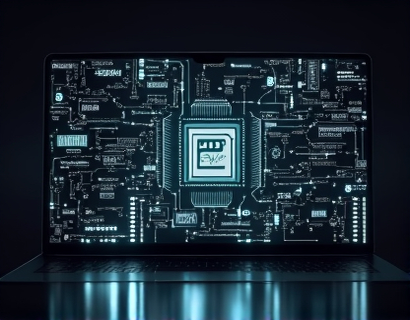Secure Pseudonym Solutions for Blockchain and AI: Ensuring Privacy and Compliance in Digital Operations
In the rapidly evolving landscape of technology, the need for robust privacy solutions has become paramount, especially in the realms of blockchain and artificial intelligence (AI). As these technologies continue to transform industries, the importance of maintaining digital privacy while complying with regulatory standards cannot be overstated. This article delves into the innovative software solutions designed to create and manage secure pseudonyms, enabling users to conduct anonymous and compliant operations in blockchain and AI environments.
Understanding Pseudonyms in Digital Contexts
Before exploring the software solutions, it's essential to understand the concept of pseudonyms in digital environments. A pseudonym is an alias or a name that replaces a person's real identity. In the context of blockchain and AI, a secure pseudonym serves as a unique identifier that masks the user's true identity, thereby enhancing privacy. This approach is particularly crucial in blockchain, where transactions are recorded on a public ledger, and in AI, where vast amounts of personal data are processed.
The Importance of Privacy in Blockchain and AI
Blockchain technology, known for its transparency, poses a paradox: while it ensures transparency in transactions, it also exposes user identities to potential risks. Similarly, AI systems often require extensive data collection, raising concerns about user privacy and data security. Regulatory frameworks such as the General Data Protection Regulation (GDPR) in the European Union and the California Consumer Privacy Act (CCPA) in the United States have set stringent standards for data protection and privacy. Non-compliance can result in hefty fines and reputational damage. Therefore, the need for solutions that ensure privacy while adhering to these regulations is critical.
Challenges in Achieving Privacy and Compliance
One of the primary challenges in blockchain and AI is balancing transparency with privacy. The immutable nature of blockchain records makes it difficult to alter or anonymize data once it has been added to the ledger. In AI, the aggregation of vast datasets often includes sensitive personal information, making it challenging to protect user identities. Additionally, the decentralized nature of blockchain and the complexity of AI algorithms complicate the implementation of privacy-preserving mechanisms.
Innovative Software Solutions for Secure Pseudonyms
To address these challenges, innovative software solutions have emerged, focusing on the creation and management of secure pseudonyms. These solutions are designed to provide users with the tools necessary to maintain their privacy while complying with regulatory standards. Let's explore some of the key features and benefits of these advanced software solutions.
Dynamic Pseudonym Generation
One of the core functionalities of these software solutions is the dynamic generation of pseudonyms. Unlike static identifiers, dynamic pseudonyms change periodically, reducing the risk of identity linkage and tracking. This approach ensures that even if a pseudonym is compromised, the damage is limited to a specific time frame. The pseudonyms are generated using cryptographic algorithms that ensure their uniqueness and unpredictability.
Decentralized Identity Management
Decentralized identity management is another critical aspect of these solutions. By leveraging blockchain technology, these platforms enable users to control their identities without relying on central authorities. Users can create, manage, and revoke pseudonyms autonomously, ensuring that their personal data remains under their control. This decentralized approach also enhances security, as there is no single point of failure.
Compliance with Regulatory Standards
Compliance with regulatory standards is a built-in feature of these software solutions. The platforms are designed to adhere to various privacy regulations, ensuring that users can operate within the legal framework. For instance, the solutions can be configured to handle data retention periods, consent management, and data minimization requirements. This compliance not only protects users from legal repercussions but also builds trust with stakeholders.
Seamless Integration and User-Friendly Interfaces
To facilitate widespread adoption, these software solutions are engineered for seamless integration with existing blockchain and AI systems. They offer user-friendly interfaces that simplify the process of creating and managing pseudonyms. Users can easily generate pseudonyms, assign them to specific transactions or interactions, and monitor their usage. This ease of use ensures that even users with limited technical expertise can benefit from enhanced privacy features.
Enhanced Security Measures
Security is a paramount concern in any privacy solution. These software solutions incorporate advanced security measures to protect pseudonyms and the data associated with them. Features such as end-to-end encryption, multi-factor authentication, and regular security audits ensure that the pseudonyms and user data are safeguarded against unauthorized access and breaches. Additionally, the use of zero-knowledge proofs and other privacy-preserving techniques further enhances the security of the pseudonyms.
Real-World Applications and Use Cases
To better understand the practical implications of these software solutions, let's explore some real-world applications and use cases.
Financial Transactions
In the financial sector, secure pseudonyms can be used to conduct transactions without revealing the user's identity. This is particularly useful in decentralized finance (DeFi) platforms, where users can participate in lending, borrowing, and trading while maintaining their privacy. The dynamic pseudonyms ensure that each transaction is traceable only to the pseudonym, not the individual, thereby reducing the risk of identity theft and financial fraud.
Healthcare Data Management
In healthcare, the protection of patient data is of utmost importance. These software solutions can be used to manage patient identities and medical records in a way that complies with regulations like HIPAA. By using secure pseudonyms, healthcare providers can share patient data for research and treatment purposes without exposing sensitive information. This approach not only ensures compliance but also enhances patient trust.
Social Media and Online Platforms
Social media and online platforms can benefit significantly from these privacy solutions. Users can create pseudonyms to interact on these platforms without revealing their real identities. This feature can help reduce online harassment and promote a safer digital environment. Additionally, platforms can use these pseudonyms to comply with data protection regulations, ensuring that user data is handled responsibly.
Future Trends and Developments
The field of secure pseudonym solutions is rapidly evolving, with ongoing research and development aimed at addressing emerging challenges and enhancing existing features. Some of the future trends include:
Integration with Web3 Technologies
As Web3 technologies gain traction, the integration of secure pseudonym solutions with decentralized applications (dApps) and non-fungible tokens (NFTs) is becoming increasingly important. These integrations will enable more sophisticated privacy-preserving mechanisms, further empowering users to control their digital identities.
Advanced Machine Learning Techniques
The incorporation of advanced machine learning techniques can enhance the security and efficiency of pseudonym management. For example, machine learning algorithms can detect and mitigate potential security threats in real-time, ensuring that pseudonyms remain secure. Additionally, these techniques can optimize the generation and management of pseudonyms, making the process more efficient and user-friendly.
Regulatory Collaboration
As the importance of privacy and compliance continues to grow, collaboration between technology providers and regulatory bodies will become more prevalent. This collaboration can lead to the development of industry standards and best practices, ensuring that privacy solutions are not only effective but also aligned with regulatory requirements.
Conclusion
In conclusion, secure pseudonym solutions play a vital role in enhancing privacy and ensuring compliance in blockchain and AI environments. These innovative software solutions offer dynamic pseudonym generation, decentralized identity management, and robust security measures, making them indispensable tools for privacy-conscious users. As technology continues to evolve, the importance of these solutions will only grow, paving the way for a more secure and private digital future.










































